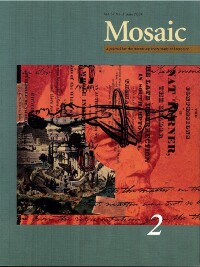Issue 37.2
Overview

General Issue
Published: June 2004
View the issue introduction or see the issue summary and contents below.
9 essays, totalling 192 pages
$15.00 CAD
The essays in this general issue of Mosaic collectively take a particular interest in writing, memory, and autobiography. Essays in the issue consider the links between autobiography, visual representations, and self; memory, mourning, and melanxiety; autobiography, painting, and pain; passion, biography, and the sacred and the profane; and memory and recollection. These ideas are explored in various works by artists and authors including William Kurelek, Fred Forest, William Chambers, Shakespeare, and Charlotte Salomon.
“The Savage Inscription”: Abolitionist Writers and the Reinscription of SlaveryROXANNE HARDE Using contemporary theories of the body, this essay reads the methods by which some white abolitionist-minded writers reinscribe the savage other in their representations of the tortured slave body. Such reproductions express anxiety over the boundaries between African slave and European or American citizen, just as those boundaries are being called into question. | |
Pain and Painting: William Kurelek and Autobiography as MourningJULIE RAK William Kurelek remains one of Canada’s best-known painters of prairie farm scenes. This essay considers Kurelek’s allegorical paintings and his autobiography, Someone with Me, as acts that chart his movement from a discourse of melancholia to mourning, from art that re-enacts psychic pain to art that records social losses. | |
Beyond the Bounds of Truth: Cultural Translation and William Chambers’s Chinese GardenDAVID PORTER William Chambers’s writings on Chinese gardening provide a rich context for understanding the workings of eighteenth-century exoticism. This essay re-examines these works through the lens of the travel narrative to highlight the psychological effects manifested in the encounter with foreignness. | |
Remembering Forbidding Mourning: Repetition, Indifference, Melanxiety, HamletNOURI GANA By reading Freud’s metapsychological papers in tandem with Shakespeare’s Hamlet, this essay strives both to caution against the boomerang effects inherent in the psychically volatile act of remembering, effects that are oftentimes slighted or completely overlooked by the currently proliferating positivistic discourses of remembering, and to offer thereof a corrective to many previous psychoanalytic diagnoses of Shakespeare’s most worked-over play. | |
From Aesthetics to Liminality: The Web Art of Fred ForestMICHAEL F. LERUTH This essay examines the career of French media art pioneer Fred Forest. It argues that Forest has staked out an original position in the field of web art by virtue of a number of online rituals that problematize the threshold, or limen, between the “real world” and cyberspace. | |
Autobiography, Visual Representations, and the Preservation of SelfLEAH WHITE Charlotte Salomon completed her autobiography, Life? or Theater? during the height of Nazi occupation in Europe and as a German-Jewish woman experienced first hand the trauma of Nazi oppression. This essay examines how Salomon in her autobiography uses a combination of written text and visual representations to create an extraordinary work of resistance and preservation. | |
Troubling Language: Avant-Garde Strategies in the Poetry of Medbh McGuckianROBERT BRAZEAU This essay examines the avant-garde poetry of Medbh McGuckian, and argues that these poems destabilize ideological discourses that delimit the role of women in contemporary Northern Ireland. McGuckian’s poetry, therefore, shares with some contemporary feminist theory, and the philosophy of Ludwig Wittgenstein, an interest in how excessive uses of language can rework existing social codes. | |
Passion in Elizabeth Smart’s By Grand Central Station I Sat Down and Wept: The Sacred and the ProfaneBirgitta Fröjdendahl This essay examines how By Grand Central Station I Sat Down and Wept employs the concept of passion in the sacred sense of the Passion of Christ and in the profane sense of erotic love. The argument shows how intertextual links between theology and literature can lead to challenging and provocative analysis of passionate love. | |
The Conceptual Integration Network Model as a Paradigm for Analysis of Complex Narrative DiscoursePILAR ALONSO Focussing on the metaphorical structure of Updike’s short story “The Wallet,” this essay shows, on theoretical and practical grounds, the applicability of the conceptual network model presented by Mark Turner and Gilles Fauconnier to the analysis of complex narrative texts, and its efficiency for the cognitive consideration of their interpretation processes. |